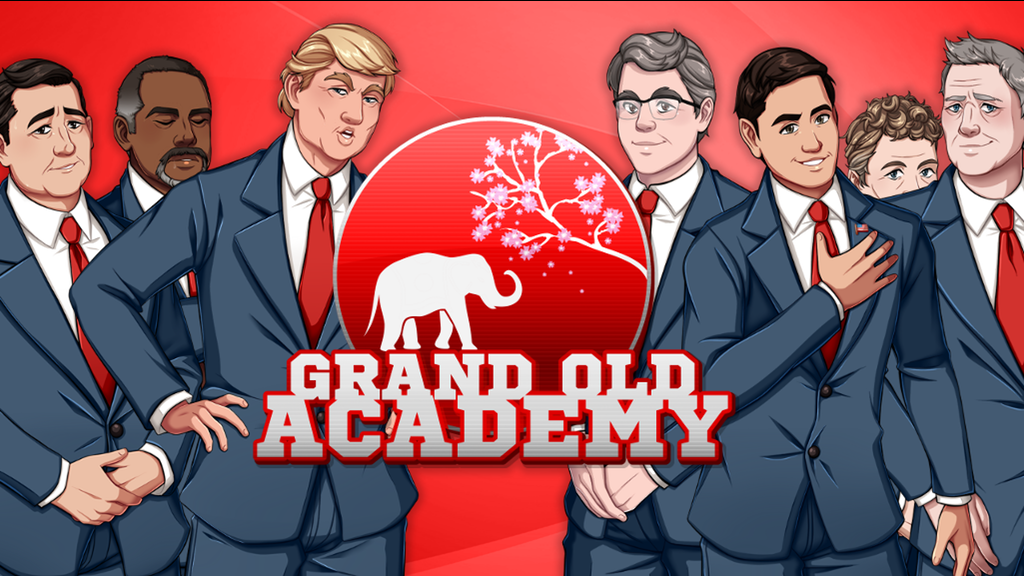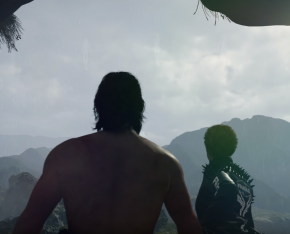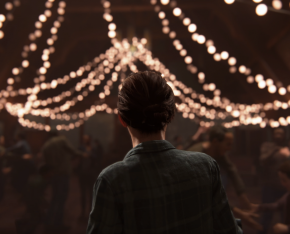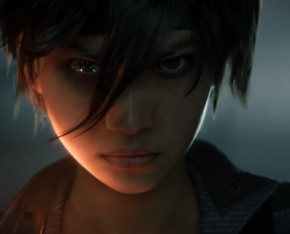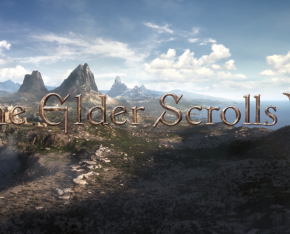By Anni Simpson on November 15, 2016 at 3:12pm
Last Tuesday, the United States voted in the now president-elect Donald Trump, as well as a majority Republican House and Senate. Depending on your political leanings, Wednesday was full of elation or anger and fear. Even gamers not terribly interested in American politics can't escape the enormity of a major election and none more so than Robert Amster, developer for the Kickstarter game "Grand Old Academy: A Satirical Dating Sim".
"Grand Old Academy" is, obviously, a dating sim which focuses on members of this year's Republican candidates - well before Trump was selected. Players enter a "prestigious private high school" as Mori America just in time for the debate championship. America can develop friendships or even blossom a loving relationship with Jeb, Ben, Marco, Rand, Ted, John, and of course Donald. Over the course of her studies, she also rooms with the debate moderator, a girl named Megyn.
Its tone is satirical, but lighthearted: it is a story about romance, friendship, and competition, not actual political issues. Kickstarter
If the game hits its reward, it aims to release in May 2017 completely free, offering 7 romanceable characters, 25 endings, and achievements, among other assets. The demo is also currently available on Windows, Mac OS, and Linux. As of the writing of this article, however, the game has only hit approximately a third of its $13,500 goal.
Player Theory spoke to Amster about his project:
Player Theory: Where did you get the inspiration for Grand Old Academy?
Robert Amster: I'd had the basic idea for Grand Old Academy bouncing around in my head since last October, but seeing the success of Asagao Academy is what crystallized it and made me realize that this was a viable idea. (I've seen several people parallel Grand Old Academy to Asagao, both favorably and unfavorably.) I was also inspired by Hatoful Boyfriend, as I think most of the absurdist visual novels of the last half-decade have been. I also drew some inspiration from Arrested Development. Looking back on the show now and realizing how deftly they satirized the heavy topics of the George W. Bush years while keeping individual episodes farcical, upbeat, and comedic made me optimistic that I could do the same. And finally, the real-life saga of Jeb Bush has always been the engine driving everything for me. In some ways, his story is a classic Shakespearean tragedy: the anointed son, next in line to the throne, unseated by the upstart demagogue. The pressures of family from above, and an unreceptive electorate below. When examined in this context, it's kind of heartbreaking. But looked at up-close, it's slapstick. The turtles. The guacamole. The simple phrase "low energy" toppling a dynasty. I never expected to feel as much pity for a Republican politician as I ended up feeling for Jeb Bush. And I knew that there was a story there.
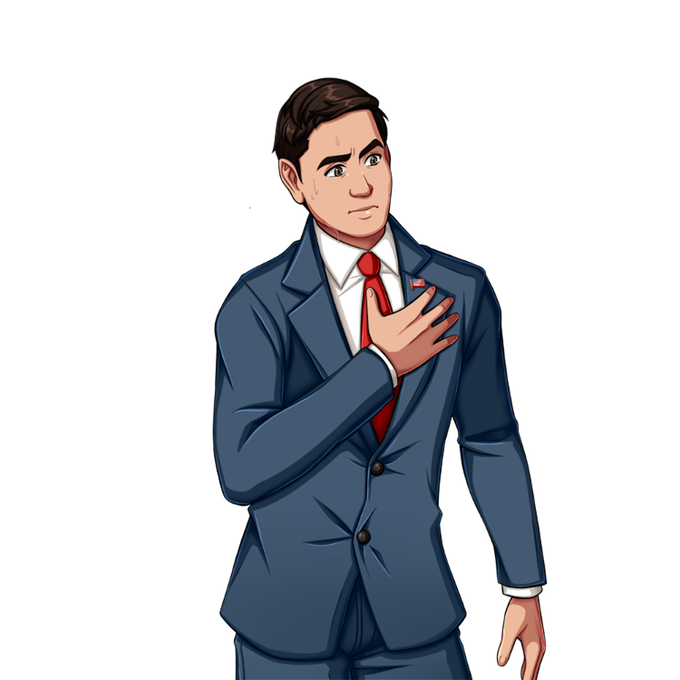
PT: Why did you focus on the GOP specifically, as opposed to other parties, all parties, or even international leaders elsewhere?
RA: This year, the GOP had a level of drama on the personal level that I can't remember ever seeing on so prominent a stage in politics. I think much of that was due to the size of its field. When two people are running head-to-head, there are only so many ways to contrast them. (And that's why I found the drama of the Democratic primary less interesting after the colorful characters of Jim Webb and Lincoln Chafee were whisked off the stage and the fairly unremarkable Martin O'Malley faded away.) But with the GOP, we had seventeen people, almost all with big personalities, bouncing off each other and clashing in ways that exposed new facets of their characters. Of course, Trump was in many ways the cueball that set the other balls on their collision courses, and the other candidates' mounting desperation in attempting to deal with Trump gave us insight into some aspects of their personas that wouldn't necessarily have come to light in a more civil campaign. To sum it up: the 2016 GOP primary felt like high school drama. So why not frame it as exactly that?
PT: How do you think the election will affect the rest of your game's development?
RA: I think it will make everything feel a little more weighty and consequential. A "what if?" game can afford to be a little more whimsical, but since the plot has suddenly become tied in with very serious real-world consequences, I'll need to make the satire a little more pointed and focused. I think we can still make more or less the game I set out to make, but it will definitely need some nudging in both tone and content.
PT: Although you're not at your goal yet, how do you feel about the reception of the game?
RA: The overall reception has been a bit more mixed than I expected. I always knew that there would be people repulsed by the idea— frankly, there are legitimate reasons for them to be. In some ways, that's the point. But I didn't expect quite as much. On the other hand, I've gotten a much better than expected reception from self-identified Republicans. I was afraid that they would feel insulted or ridiculed by the game's very existence. Instead, many Republicans have had a great sense of humor about it, and even several staffers from Republican politicians' campaigns have sent me messages of approval and encouragement. And there are plenty of people who've said some variant on, "I have no idea what the hell you're doing, but it seems creative and weird, and I wish you good luck with it."
PT: How did you come to meet the rest of you team, notably Adyrn who created the sprites?
RA: I found the majority of my team through the Lemma Soft forums (https://lemmasoft.renai.us/forums/index.php), which is a forum for visual novel creators to collaborate with each other. When I saw Adyrn's thread offering her sprite services, I was instantly hooked by her style.
PT: What prompted you to release the game for free if it's funded?
RA: Mainly, it's an incentive for the crowdfunding process. I think that backers are more inclined to give to projects that will be free rather than ones that they'll have to pay for once they're finished. I think it creates a collaborative atmosphere among backers, where they feel like they're pitching in to create something that will benefit a wider range of people once it's finished, rather than feeling like they're just pre-ordering something for themselves.
PT: What can players expect from the side quest?
RA:
PT: What are your inspirations from gaming in general?
RA: I'm actually a pretty infrequent game-player myself, but I am an avid consumer of let's-play style videos. Seeing the ways that other people respond to games gives me a greater understanding of what works and what doesn't, what lands and what misses. It's particularly enlightening to watch different people play through the same game, and notice what things they all pick up on. Growing up, I played a lot of JRPGs, both good and bad, and they gave me an appreciation for a convoluted and drama-filled plot. I also enjoy games like Pokemon and Animal Crossing that are slow-paced and casual, but have an element of collecting to them; I think the satisfaction I get from filling up a pokedex or completing a furniture collection is why I included so many unlockables in Grand Old Academy's demo.
If you're interested or just need to get away from the reality of our political climate, Grand Old Academy may be just the right thing to back.
Kickstarter
